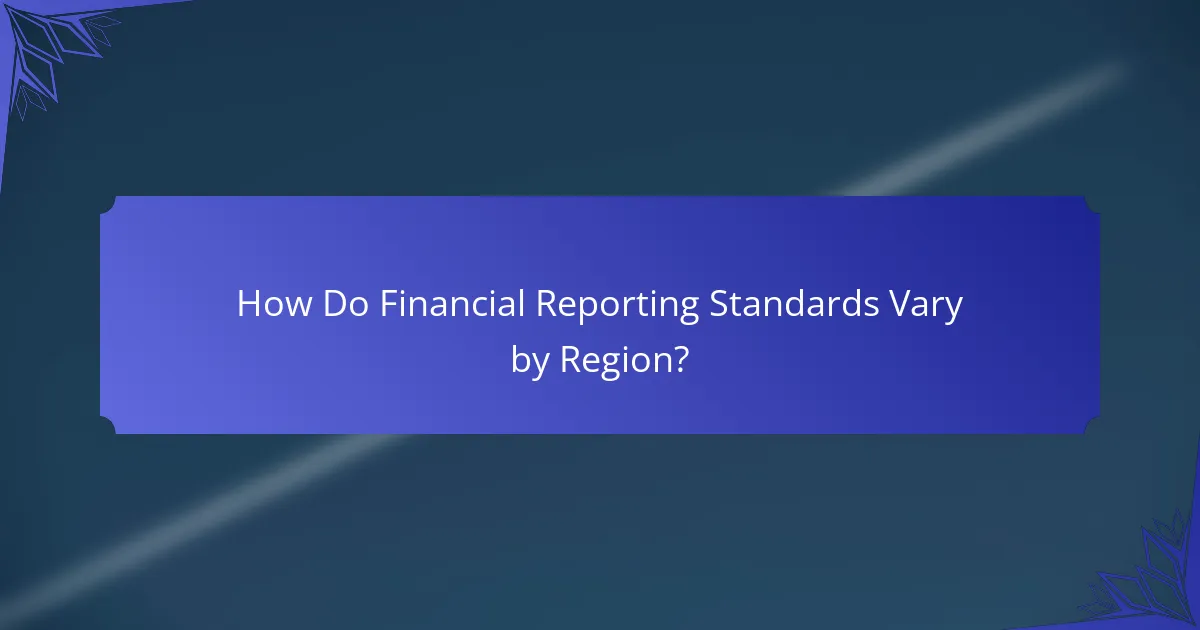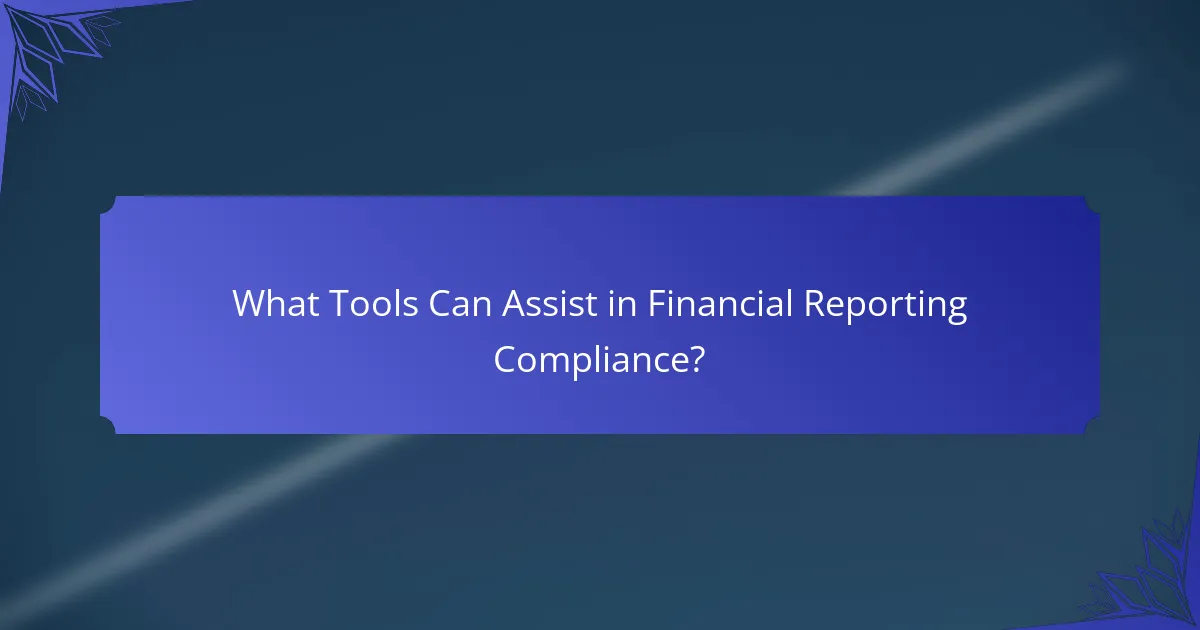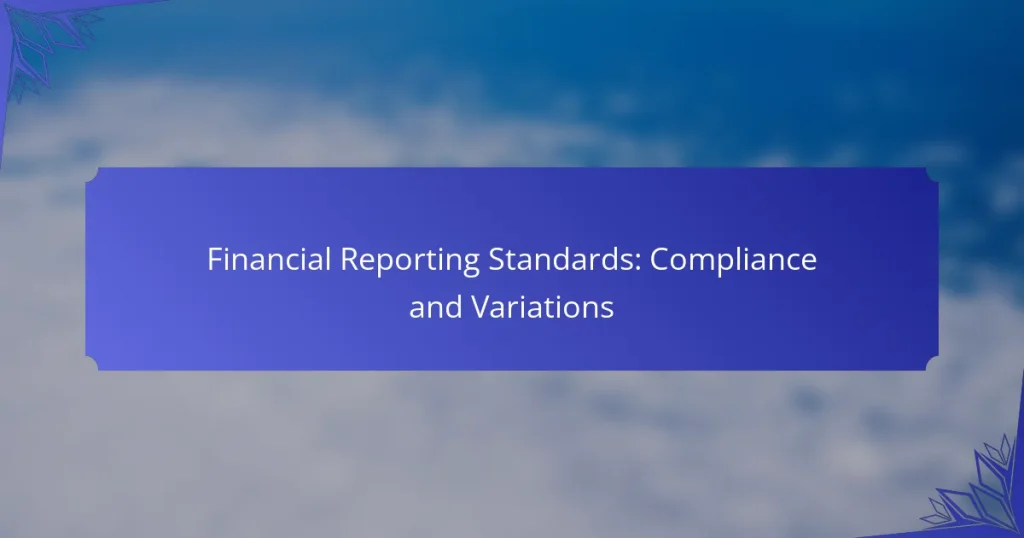Financial reporting standards, primarily governed by Generally Accepted Accounting Principles (GAAP) in the US, play a crucial role in ensuring consistency and transparency in financial disclosures. Organizations must adhere to these standards through systematic processes and controls to maintain compliance, which is essential for avoiding legal penalties and protecting their reputation. Understanding the implications of non-compliance is vital for safeguarding an organization’s financial integrity and future success.

What Are the Key Financial Reporting Standards in the US?
The key financial reporting standards in the US primarily include Generally Accepted Accounting Principles (GAAP) and guidelines set by the Financial Accounting Standards Board (FASB). These standards ensure consistency, transparency, and accountability in financial reporting across various industries.
Generally Accepted Accounting Principles (GAAP)
Generally Accepted Accounting Principles (GAAP) are a set of rules and guidelines that govern financial reporting in the United States. They provide a framework for preparing financial statements, ensuring that they are consistent and comparable across different organizations.
GAAP covers various aspects of accounting, including revenue recognition, balance sheet classification, and materiality. Companies must adhere to these principles to maintain credibility with investors and regulators.
Financial Accounting Standards Board (FASB) Guidelines
The Financial Accounting Standards Board (FASB) is the authoritative body responsible for establishing GAAP in the US. FASB develops and issues standards that address specific accounting issues and improve the overall quality of financial reporting.
FASB guidelines are crucial for ensuring that financial statements are not only accurate but also relevant to users. Organizations must stay updated on FASB pronouncements to ensure compliance and avoid potential penalties.
International Financial Reporting Standards (IFRS) Comparison
International Financial Reporting Standards (IFRS) are used globally, while GAAP is specific to the US. One key difference is that IFRS tends to be more principles-based, allowing for greater interpretation, whereas GAAP is more rules-based, providing detailed instructions for various scenarios.
For companies operating internationally or considering foreign investments, understanding the differences between GAAP and IFRS is essential. For example, revenue recognition criteria differ significantly, which can impact financial results and comparability.

How to Ensure Compliance with Financial Reporting Standards?
To ensure compliance with financial reporting standards, organizations must implement systematic processes and controls that align with established regulations. This involves regular evaluations, training, and technology integration to maintain accuracy and transparency in financial reporting.
Regular Internal Audits
Conducting regular internal audits is crucial for verifying adherence to financial reporting standards. These audits should assess the accuracy of financial statements and ensure that all transactions are recorded properly. Aim for quarterly audits to identify discrepancies early and mitigate risks.
During audits, focus on key areas such as revenue recognition, expense reporting, and compliance with applicable regulations. Establish a checklist to streamline the audit process, ensuring all necessary documents and records are reviewed thoroughly.
Training for Financial Staff
Providing ongoing training for financial staff is essential to maintain compliance with financial reporting standards. Regular workshops and seminars can keep employees updated on changes in regulations and best practices. Consider offering training sessions at least biannually to reinforce knowledge and skills.
Incorporate real-world scenarios and case studies into training programs to enhance understanding. Encourage staff to pursue certifications in relevant standards, which can further improve their expertise and the organization’s overall compliance posture.
Implementation of Compliance Software
Implementing compliance software can significantly streamline the process of adhering to financial reporting standards. Such software automates data collection, reporting, and analysis, reducing the risk of human error. Look for solutions that offer real-time updates and customizable reporting features to meet specific organizational needs.
When selecting compliance software, consider factors such as user-friendliness, integration capabilities with existing systems, and support services. Regularly review and update the software to ensure it aligns with the latest financial regulations and reporting requirements.

What Are the Consequences of Non-Compliance?
Non-compliance with financial reporting standards can lead to serious repercussions for organizations, including legal penalties, damage to reputation, and significant financial losses. Understanding these consequences is crucial for maintaining compliance and safeguarding the organization’s future.
Legal Penalties
Organizations that fail to comply with financial reporting standards may face various legal penalties, including fines and sanctions. These penalties can vary widely depending on the jurisdiction and the severity of the non-compliance, often ranging from thousands to millions of dollars.
In some cases, non-compliance can lead to criminal charges against executives or board members, resulting in imprisonment or disqualification from serving in future corporate roles. It is essential for companies to implement robust compliance programs to mitigate these risks.
Reputation Damage
Non-compliance can severely damage an organization’s reputation, leading to a loss of trust among stakeholders, including investors, customers, and employees. A tarnished reputation can result in decreased customer loyalty and a decline in market share.
Restoring a damaged reputation often requires significant time and resources, including public relations campaigns and enhanced transparency measures. Companies must prioritize compliance to protect their brand image and maintain stakeholder confidence.
Financial Losses
Financial losses due to non-compliance can manifest in various ways, including increased operational costs, loss of business opportunities, and potential lawsuits. Companies may also face higher insurance premiums or difficulty securing financing as a result of non-compliance issues.
To minimize financial losses, organizations should regularly review their compliance processes and invest in training for employees. Proactive measures can help prevent costly mistakes and ensure adherence to financial reporting standards.

How Do Financial Reporting Standards Vary by Region?
Financial reporting standards differ significantly across regions, primarily influenced by local regulations and economic environments. The two most prominent frameworks are the US Generally Accepted Accounting Principles (GAAP) and the International Financial Reporting Standards (IFRS), each tailored to meet the needs of their respective markets.
Differences Between US GAAP and IFRS
US GAAP and IFRS have distinct approaches to financial reporting, reflecting different regulatory philosophies. For instance, US GAAP is rules-based, providing detailed guidelines for various scenarios, while IFRS is principles-based, allowing for more interpretation and flexibility.
Key differences include revenue recognition, where IFRS emphasizes the transfer of control, whereas US GAAP focuses on the transfer of risks and rewards. Additionally, the treatment of leases and financial instruments varies, impacting balance sheet presentation and financial ratios.
Regional Compliance Requirements
Compliance with financial reporting standards varies by region, often dictated by local laws and regulatory bodies. In the European Union, companies are generally required to use IFRS for consolidated financial statements, while smaller entities may have the option to use local GAAP.
In contrast, US companies must adhere strictly to US GAAP, with the Securities and Exchange Commission (SEC) enforcing compliance. Understanding these requirements is crucial for businesses operating internationally, as non-compliance can lead to significant penalties.
Impact of Local Regulations
Local regulations significantly influence how financial reporting standards are applied. For example, tax laws may dictate specific accounting treatments that differ from the standards themselves, affecting reported earnings and tax liabilities.
Moreover, countries may have unique disclosure requirements, such as additional reporting on environmental, social, and governance (ESG) factors. Companies must stay informed about these regulations to ensure compliance and avoid legal repercussions.

What Are the Best Practices for Adapting to Changes in Standards?
Adapting to changes in financial reporting standards requires a proactive approach that emphasizes continuous learning, engagement with regulatory bodies, and the use of technology. These practices help organizations remain compliant and effectively manage the implications of new regulations.
Continuous Education Programs
Implementing continuous education programs is essential for keeping finance teams updated on evolving standards. Regular training sessions, workshops, and online courses can enhance knowledge and skills related to compliance and reporting practices.
Organizations should consider partnering with professional associations or educational institutions to provide relevant training. This can ensure that employees are well-versed in the latest standards and best practices.
Engagement with Regulatory Bodies
Active engagement with regulatory bodies can provide valuable insights into upcoming changes in financial reporting standards. Organizations should participate in forums, webinars, and consultations hosted by these bodies to stay informed about regulatory developments.
Establishing relationships with regulators can also facilitate direct communication regarding compliance issues, helping organizations to navigate complex requirements more effectively.
Use of Technology for Updates
Leveraging technology can streamline the process of adapting to changes in financial reporting standards. Tools such as compliance software and automated reporting systems can help organizations quickly implement updates and maintain accurate records.
Additionally, subscribing to industry newsletters or using platforms that aggregate regulatory updates can ensure that finance teams receive timely information about changes, minimizing the risk of non-compliance.

What Tools Can Assist in Financial Reporting Compliance?
Various tools can significantly enhance financial reporting compliance by streamlining processes and ensuring accuracy. These tools range from software solutions to frameworks that help organizations adhere to established standards.
Accounting Software
Accounting software is essential for maintaining accurate financial records and generating reports that comply with regulations. Popular options like QuickBooks and Xero automate many tasks, reducing the risk of human error. They also offer features such as real-time reporting and integration with other financial tools.
When selecting accounting software, consider factors like scalability, user-friendliness, and compliance with local regulations such as IFRS or GAAP. Many platforms provide templates that align with these standards, making it easier to produce compliant reports.
Compliance Management Systems
Compliance management systems (CMS) help organizations track and manage their adherence to financial reporting standards. These systems often include features for monitoring changes in regulations, conducting audits, and maintaining documentation. By centralizing compliance activities, a CMS can enhance transparency and accountability.
Choose a CMS that integrates well with your existing financial systems and offers customizable reporting features. Regularly updating the system to reflect changes in regulations is crucial for maintaining compliance.
Financial Reporting Frameworks
Financial reporting frameworks provide guidelines and best practices for preparing financial statements. Frameworks such as IFRS and GAAP outline the necessary components of financial reports, ensuring consistency and comparability. Utilizing these frameworks can help organizations avoid common pitfalls in financial reporting.
Familiarize your team with the relevant framework for your jurisdiction, as this knowledge is vital for accurate reporting. Regular training sessions can help keep staff updated on any changes in the frameworks.
Audit Tools
Audit tools assist in reviewing financial reports for compliance and accuracy. These tools can automate the audit process, identify discrepancies, and generate reports that highlight areas needing attention. Examples include ACL and IDEA, which are widely used for data analysis in audits.
Implementing audit tools can significantly reduce the time spent on manual checks and enhance the reliability of financial reports. Ensure that your audit tools are compatible with your accounting software for seamless data integration.


